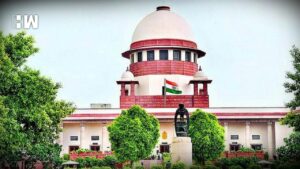Review Plea In Supreme Court Filed Against Judgement Pertaining To Upholding Various Provisions Of PMLA

On July 27, the Supreme Court upheld the validity of various provisions of the Prevention of Money Laundering Act (PMLA) which empowers ED for making arrests, conducting search and seizures and attaching proceeds of crime. New Delhi: A review petition has been filed in the Supreme Court against the judgement…
The post appeared first on .


On July 27, the Supreme Court upheld the validity of various provisions of the Prevention of Money Laundering Act (PMLA) which empowers ED for making arrests, conducting search and seizures and attaching proceeds of crime.
New Delhi: A review petition has been filed in the against the judgement pertaining to upholding various provisions of the Prevention of Money Laundering Act.The plea was mentioned by an advocate before a bench headed by Chief Justice of India NV Ramana and the bench agreed to list the plea. When the lawyer mentioned the plea, the CJI asked “is this plea on Justice Khanwilkar’s judgement?” The lawyer replied with a yes.
On July 27, the Supreme Court upheld the validity of various provisions of the Prevention of Money Laundering Act (PMLA) which empowers ED for making arrests, conducting search and seizures and attaching proceeds of crime.
The court had also held that the Enforcement Case Information Report (ECIR) cannot be equated with First Information Report (FIR) and ED officers are not police officers.The court was hearing various pleas challenging the various provisions of the Prevention of Money Laundering Act (PMLA) on Wednesday.
On March 15 the top court had reserved its order on a batch of petitions challenging certain provisions of the Prevention of Money Laundering Act (PMLA). Prominent leaders like Karti Chidambaram and former Jammu and Kashmir Chief Minister Mehbooba Mufti were among the petitioners in the case.
Their petitions raised multiple issues including the absence of a procedure to commence investigation and summoning, while the accused was not made aware of the contents of the Enforcement Case Information Report (ECIR).
Also Read:SC Extends Status Quo, Asks Parties To File Reply On IOA Plea Challenging Delhi HC Order
Section 45 deals with offences to be cognizable and non-bailable. Section 50 of the PMLA empowers the ‘authority’ i.e. officers of the Enforcement Directorate, to summon any person to give evidence or produce records. All persons summoned are bound to answer questions put to them, and to produce the documents as required by the ED officers, failing which they can be penalised under the PMLA.
However, the Centre had justified the constitutional validity of the provisions of PMLA. The Centre has apprised the court that around 4,700 cases are being investigated by the Directorate of Enforcement.
The Centre said that PMLA is not a conventional penal statute but is a statute that is aimed at necessarily preventing money laundering, regulating certain activities relatable to money laundering, aims at confiscating the “proceeds of crime” and the property derived therefrom and also requires offenders to be punished by the competent court after filing of a complaint.
The Centre submitted that India, and its version of the Prevention of Money Laundering Act, 2002, is merely a cog in this international vehicle. It submitted that India, as a signatory to the treaties and an important participant in the international process and the fight against money laundering, is bound legally and morally, to adopt the global best practices and respond to the changing needs of the times.
(This story has not been edited by HW News staff and is auto-generated from a syndicated feed.)
The post Review Plea In Supreme Court Filed Against Judgement Pertaining To Upholding Various Provisions Of PMLA appeared first on HW News English.


